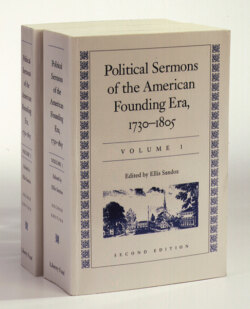Читать книгу Political Sermons of the American Founding Era: 1730–1805 - Группа авторов - Страница 22
На сайте Литреса книга снята с продажи.
ОглавлениеELISHA WILLIAMS (1694–1755). As the son of Reverend William Williams (1665–1741), a great-grandson of John Cotton and of Governor Simon Bradstreet, and the younger brother of William Williams, Jr., Elisha Williams was a member of an outstanding and devout New England family. Born in Hatfield, Massachusetts, he was graduated from Harvard in 1711, studied theology with his father, read law, preached to seamen in Nova Scotia, tutored Yale students at his home for several years (including Jonathan Edwards the elder), and, in 1722, settled as pastor of a Congregational church in Wethersfield, Connecticut. There Williams remained only four years before becoming Yale University rector, a position he held until 1739. Ezra Stiles, a future Yale president who was graduated there during Williams’s tenure, called him “a good classical scholar, well versed in logic, metaphysics, and ethics, and in rhetoric and oratory [who] delivered orations gracefully and with animated dignity” (John H. Harkey, American Writers Before 1800).
His departure from Yale was attributed to poor health, but Williams, who had also been in the Connecticut General Assembly, served there again from 1740 to 1749. Politically ambitious, he was thought to be interested in becoming governor of Connecticut. He also served as a judge on the Connecticut Supreme Court, was a chaplain during the 1745 expedition that captured Louisbourg, was appointed colonel and commander-in-chief of forces organized to invade Canada (a plan that was abandoned), and was a delegate to the Albany Congress in 1754, which devised the first American plan of union under Benjamin Franklin’s leadership.
Signed “Philalethes,” The Essential Rights and Liberties of Protestants (1744) is Williams’s most famous work. It was occasioned by a 1742 Connecticut statute prompted by Standing Order clergymen’s resentment of Great Awakening revivalists. It prohibited ministers from preaching outside their own parishes, unless expressly invited to do so by resident ministers. Punishment for violating this law was deprivation of support and authorization to preach, a prohibition and punishment that Williams argued violated scripture, natural rights, the social contract, and the Toleration Act of 1688. These views had so antagonized people as to prevent his reelection to the Supreme Court in the previous year, and he was abused by both Old Lights and New Lights. But the pamphlet is a triumph of political theology and theory. In “Williams’s dazzling assault,” John Dunn has written, “Locke’s notions of toleration were fused with a brilliant presentation of his theory of government, and a doctrine of startling originality appeared. . . . When the cool epistemological individualism of the scholar’s closet was fused with the insistent Puritan demand for emotional autonomy, the two became transmuted into a doctrine which in the radicalism of its immediate and self-conscious social vision could not have been conceived anywhere else in the eighteenth-century world” (Political Obligation in Its Historical Context [Cambridge, 1980]).
